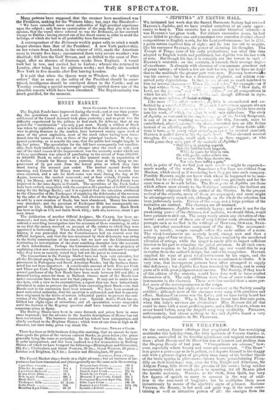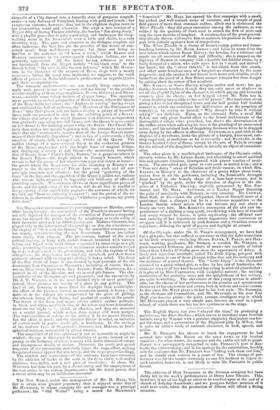THE THEATRES.
OF the various Easter offerings that propitiated the fan-worshiping multitudes this holyday-time, the fairy spectacle of Covent Garden is, as usual, unrivalled in its fanciful splendours and magical transforma- tions; albeit Beauty and the Beast has less of interest and drollery than the Sleeping Beauty of last year. "Comparisons are odorous," how- ever, especially where beauty and roses are concerned. "The Beast " is as grave a personage as he is gallant, and deports himself in his shaggy suit with a greater degree of propriety than many of his brother bipeds. of the bruin species in pilot-coats—brown hears perambulating Picca- dilly on their hind-legs : nay, even the City Knight and Alderman, Sir Aldgate Pump, falls short of the promise of his name ; being neither inveterately stolid, not much given to spouting, for all BLAND plied the handle zealously. HARLEY, as his clerk, John Quill, has very few figures of speech to carry to account in the way of addi- tion to the sum-total of laughter ; but he multiplies them most industriously by means of the algebraic signs of grimace. Madame VESTRIS, the Beauty, in her arch and quiet way, is the most enter- taining as well as attractive person of all : she emerges from thd chrysalis of a City damsel into a butterfly state of gorgeous magnifi- cence—a very Sultana of Fairyland, blazing with gold and jewels ; her sumptuous costume, however, does not in the slightest degree restrain her pleasantries, vocal and otherwise. She sings a new version of a Nigger ditty of Surrey Theatre celebrity, the burden "Jim along Josey," with a playful grace that is quite captivating, and burlesques the sleep- walking scene in La Sonnambula over a table and chairs, in a very diverting way. The puns and allusions in the dialogue-couplets are often ludicrous : the best hits are the parodies of the words of con- certed music from well-known operas ; but these not being so familiar to the audience as "I know a bank," which BLAND and HARLEY caricature in an extravagantly ridiculous fashion, are not generally appreciated. All the lyrics having reference to roses are introduced, from the Nigger melody "Coal-black rose," to the Scotch ballad, "My love is like the red, red rose," which Mr. HARRI- SON, in the character of the enamoured Beast, sings with a manly sweetness ; bating the nasal tone, incidental, we suppose, to the vocal efforts of princes in Nebuchadnezzar's predicament as regards (h)airs and their accompaniments.
The romantic enchantments—we can hardly bring ourselves to apply such prosaic terms as " scenery and machinery" to the poetical wonder-working of those stage-magicians, Messrs. GRIEVES and BRAD- WELL—include some dainty devices of elegant fancy. The opening- scene presents an arched perspective of floral bowers, where the Queen of the Roses holds her court : the " Zephyrs in waiting" having swept and ventilated the ball of audience, the" Members of the Parliament of Roses" take their places, and the bushes display a galaxy of beautiful faces, each one presented to view by the unfolding petals of a flower : the foliage that screens the royal presence then discloses a stupendous rose gradually expanding into full bloom, until the Queen is seen seated on her throne in the dazzling recess within the flower. Her Floral Ma- jesty then makes her speech, beginning with the customary announce- ment that she "continues to receive from all the foreign flowers assur- ances of their friendly disposition "; and in lieu of a state-coach, a fairy omnibus of clouds, with a winged cad, whisks off the Queen. The sudden change of a snow-covered forest to the enchanted gardens of the Beast, resplendent with the bright hues of magical foliage, and displaying a rosery in full bloom—the momentary tranporta- tion of Beauty from "Pump's Folly, Buxton," to a gorgeous saloon in the Beast's. Palace—the magic mirror in Beauty's boudoir, which reveals to her the group of her disconsolate papa and sisters at home— the grotto where the Beast casts his skin, changing at Beauty's en- trance to the throne-room of Prince Azor—are each and all sur- prisingly complete and effective : but the grand "gathering of the roses " at the last, and the apparition of the Queen's golden car, radiant with roseate light, surpasses in ingenuity and brilliancy of effect all preceding marvels. The omission of two or three superfluous pieces of music, and the quickening of the action, will do all that is needful to the prosperity of this superb fairy pageant--the costumes of which, we are told, are "from no authority whatever " ; and the period of the in- cidents is, in showman's phraseology, "whichever you please, my pretty little dear."



























 Previous page
Previous page